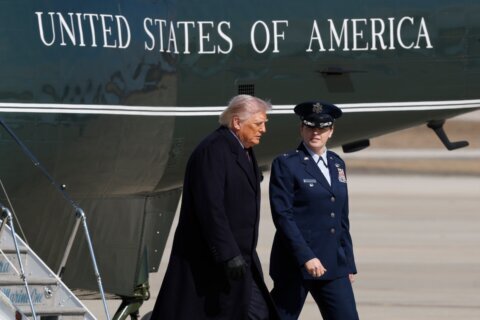WASHINGTON — The Iraqi military was badly embarrassed after its forces, which “vastly outnumbered” ISIL fighters retreated, giving up Ramadi.
Anxious to even the score, the military has launched a campaign to get it back.
“The Iraqis have already begun the process of retaking Ramadi. What we see happening now is Iraqi security forces beginning shaping operations,” said Pentagon spokesman Steve Warren.
“Shaping operations” are a series of steps taken in preparation for tactical operation as part of a decisive battle.
U.S. forces are expected to play a key role.
“The total number of forces on the ground in Iraq is 3,040. Our primary role will be air power. Additionally, we will continue to provide the Iraqis with advice and assistance,” said Warren.
The advise and assist mission accompanies U.S. forces, who are training Iraqis in various locations throughout Iraq.
Iraqi officials say they’ll take back Iraq in a few days. While expressing hope that happens, Warren said, “it’s important to remember that this fight against ISIL in Iraq is going to be a long fight –years, not months.”
A key concern in Iraq, which some believe led to the humiliating defeat in Ramadi, has been lack of reliable intelligence from Iraq’s forces. But recent developments may begin to turn the tide.
The killing of ISIL commander boosts intelligence
Fathi ben Awn ben Jildi Murad al-Tunisi is the real name of a key ISIL operative killed in a U.S. military nighttime raid on May 15 in Deir Ezzor in eastern Syria. His death could be a significant step in the unraveling of the organization,
Abu Sayaaf, as he was known by U.S. officials, was a critical cog in ISIL’s operations.
“Abu Sayyaf was a senior ISIL leader who, among other things, had a senior role in overseeing ISIL’s illicit oil and gas operations – a key source of revenue that enables the terrorist organization to carry out their brutal tactics and oppress thousands of innocent civilians. He was also involved with the group’s military operations,” National Security Council spokeswoman Bernadette Meehan said in a statement on Saturday.
Killed along with almost a dozen others, during a fierce firefight with Delta Force, sources familiar with the strike said al-Tunisi had the ear of ISIL leader Abu Bakr al-Baghdadi, control of a significant part of the organization’s income and computers containing valuable information about the organization and its plans.
In addition to seizing computers and other forensics found in the compound, his wife Umm Sayyaf is now in U.S. military custody.
“We suspect that Umm Sayyaf is a member of ISIL, played an important role in ISIL’s terrorist activities and may have been complicit in the enslavement of the young woman rescued last night,” said Meehan in the statement after the raid.
“It’s potentially huge,” said Robin Simcox, research fellow at the Henry Jackson Society, a London-based think tank.
“There haven’t been huge opportunities to get great human intelligence from detained terrorists on the ground.”
Her capture could be a substantial intelligence breakthrough.
“They’ll be interrogating her as we speak. One of the things we’ve lacked in this war against ISIS is human intelligence, because of the very nature of the U.S. operation over there, said Simcox.
Most of the militants targeted in U.S. led operations were killed.
That human intelligence could very well have saved the lives of several American hostages who were brutally and publicly executed by ISIL. James Foley, Steven Sotloff and Peter Kassig were all beheaded on video by an ISIL operative named Jihadi John.
Another American, Kayla Mueller, whom ISIL said was killed in a Jordanian airstrike was of particular interest in the days leading up the raid.
“There is also some suggestion that he was the man that was holding Kayla Muller, the U.S. hostage,” said Simcox.
“Harvesting those potential sources of information about Abu Sayaaf, about the way the oil and gas operation runs, about the situation with Kayla Mueller and other former hostages is one thing that the U.S. will be looking to take now.”
ISIL suffering from internal struggles
Aside from trying to defeat ISIL, western authorities are interested in learning all they can about ISIL’s weaknesses. There have been rumblings about trouble inside the organization which led to internal purges to weed out the malcontents.
Foreign intelligence sources point to at least two documented attempts to topple ISIL’s leadership.
One attempt last December was allegedly planned by several Azerbaijani men who were caught and executed. Another took place early in February 2015. Several prominent figures in the Syrian city of Raqqa planned an overthrow, but the plot failed and more than 100 people were rounded up and executed.
If Iraq’s military is able to push ISIL out of Ramadi, U.S. military officials are optimistic it will degrade ISIL’s forces, morale and weapons.
ISIL’s success has largely resulted from strategic planning and stealing. By all accounts ISIL is wealthy for a terror group. Each time they capture a town, they loot the banks and according to U.S. officials, they’ve stolen more than $675 million dollars that way.
A defeat in Ramadi could also deal a significant blow to ISIL’s finances. The organization relies on extortion of Iraqis under their control to raise several million dollars a month.
U.S. officials say ISIL’s “illicit oil and gas” operations, under al-Tunisi administration, were generating more than a million dollars a day before U.S. airstrikes started, but the officials say at this point they are now down to $2 or $3 million a week.








